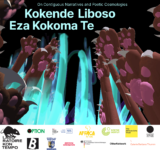Edwige-Renée Dro
Ahead of tomorrow’s release of the shortlist for our short story competition, one of the judges, Edwige-Renée Dro, shares her thoughts on the stories and Cameroonian writing.
Cliquez ici pour lire la version en français
When Dzekashu MacViban, the Founding Editor of Bakwa magazine contacted me to be one of the judges of their short story competition, I jumped at the chance. I like reading and I’m always interested in knowing what is happening in other African literary ecosystems. Furthermore, the fact that this competition welcomed entries in French and English appealed to me as a translator and a writer from a French-speaking country.
Along with three other judges, I received 66 stories (after 6 were disqualified, two of which were from Nigeria) divided up between 29 stories in English and 37 stories in French, with themes ranging from love (bien sûr), to schooling the girl child, to infertility in marriages, to falling in love with ghosts! and women’s conditions … There were even one or two fables. We are also in Africa and if the writer is called to be the conscience of her society, then, texts dealing with politics had their place.
I learned words like beignetariat, expressions like Excuse ma vie; I now know that there is a Samuel Eto’o Fils Junction somewhere in Yaoundé, and I want to go to bois Sainte Anastasie.
The bilingualism of Cameroon was also brought out in many of the stories, especially the ones written in English, where some of the dialogue was in French. At first, I found it interesting and lauded it as proof of a country successfully doing bilingualism. But we were judging the stories in a period where some people in the English Speaking parts of Cameroon, notably in Buea, Bamenda and Kumba, were protesting against the system and advocating reform.
A comment I read on Facebook regarding the tensions mentioned the fact that an Anglophone Cameroonian needed to speak French in order to be able to navigate the Cameroonian administration, whereas a Francophone didn’t have the burden to speak English. Should that truly be the case, I’m amazed that fiction dealt with that in a nuanced fashion. That is why I love fiction, and for a continent still dealing with the process of decolonisation, fiction is, for me, a powerful instrument to deal with all those complex issues we face.
Some of the expressions, however quintessentially Cameroonian, did not need to be explained at the bottom of the text. I would rather the meaning was clear from the context. In most cases, that was the case.
Bakwa magazine’s Short Story Competition was also open to Cameroonians in the diaspora, and while the identities of the participants were unknown to us, it was wonderful to have stories set in places like Scotland or Central African Republic. For a new, possibly one-off story competition, most of the stories submitted were of a high calibre. While art may take its inspiration from real life, it is however important to apply a good dose of imagination to the process.
Show, don’t tell, is a phrase every fiction writing manual/tutor insists upon. But the best way to learn the Show, don’t tell process is to read the countless great novels and short stories out there, which help us in perfecting our craft. There were quite a few stories where the writer was insistent about getting his/her message through, to the detriment of telling us a story, too many factions disguised as fiction, and on a technical level, a few novel excerpts being proposed as short stories because the word count of those excerpts satisfied the number of words stipulated in the competition guidelines. But a short story is not a short novel.
I love reading, as I mentioned earlier, and I always appreciate it when the writer respects my intelligence. Some of the expressions, however quintessentially Cameroonian, did not need to be explained at the bottom of the text. I would rather the meaning was clear from the context. In most cases, that was the case.
Another bugbear: spelling mistakes, of the blatant sort, which could have been removed, had the writer(s) re-read their texts. The morale of that story is to write the text well ahead of the deadline, let it rest, and come back to it, removing spelling errors, showing where telling has been done, and just killing the darlings. A writer is a murderous being.
All in all, I enjoyed judging this competition, and I hope that for a second edition, it might be opened up to other Francophones on the continent and in the diaspora.





